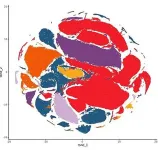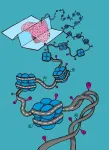(Press-News.org) The world’s population has increased by more than 2.6-fold in the last 60 years. The growing trend continues – projections indicate that the number of people living on our planet will grow to 9 billion by 2037 from 8 billion in 2022. These numbers underscore the need for considering family planning; however, there have been limited breakthroughs in contraception in recent decades. Specifically for men, there are no oral contraceptive pills available.
In a study published in the journal Science, researchers at Baylor College of Medicine and collaborating institutions show in animal models that a novel, non-hormonal sperm-specific approach offers a promising option for reversible human male contraception.
“Although researchers have been investigating several strategies to develop male contraceptives, we still do not have a birth control pill for men,” said corresponding author Dr. Martin Matzuk, director of the Center for Drug Discovery and chair of the Department of Pathology and Immunology at Baylor. “In this study we focused on a novel approach – identifying a small molecule that would inhibit serine/threonine kinase 33 (STK33), a protein that is specifically required for fertility in both men and mice.”
Previous research has shown that STK33 is enriched in the testis and is specifically required for the formation of functional sperm. In mice, knocking out the Stk33 gene renders the mice sterile due to abnormal sperm and poor sperm motility. In men, having a mutation in the STK33 gene leads to infertility caused by the same sperm defects found in the Stk33 knockout mice. Most importantly, mice and men with these mutations have no other defects and even have normal testis size.
“STK33 is therefore considered a viable target with minimal safety concerns for contraception in men,” said Matzuk, who has been on faculty at Baylor for 30 years and is Baylor’s Stuart A. Wallace Chair and Robert L. Moody, Sr. Chair of Pathology and Immunology. “STK33 inhibitors have been described but none are STK33-specific or potent for chemically disrupting STK33 function in living organisms.”
Finding an effective STK33 inhibitor
“We used DNA-Encoded Chemistry Technology (DEC-Tec) to screen our multi-billion compound collection to discover potent STK33 inhibitors,” said first author Dr. Angela Ku, staff scientist in the Matzuk lab. “Our group and others have used this approach before to uncover potent and selective kinase inhibitors.”
The researchers uncovered potent STK33-specific inhibitors, from which they successfully generated modified versions to make them more stable, potent and selective. “Among these modified versions, compound CDD-2807 turned out to be the most effective,” Ku said.
“Next, we tested the efficacy of CDD-2807 in our mouse model,” said co-author Dr. Courtney M. Sutton, postdoctoral fellow in the Matzuk lab. “We evaluated several doses and treatment schedules and then determined sperm motility and number in the mice as well as their ability to fertilize females.”
Compound CDD-2807 effectively crossed the blood-testis barrier and reduced sperm motility and numbers and mice fertility at low doses. “We were pleased to see that the mice did not show signs of toxicity from CDD-2807 treatment, that the compound did not accumulate in the brain, and that the treatment did not alter testis size, similar to the Stk33 knockout mice and the men with the STK33 mutation,” Sutton said. “Importantly, the contraceptive effect was reversible. After a period without compound CDD-2807, the mice recovered sperm motility and numbers and were fertile again.”
“In our paper, we also present the first crystal structure for STK33,” said co-author Dr. Choel Kim, associate professor of biochemistry and molecular pharmacology and member of the Dan L Duncan Comprehensive Cancer Center at Baylor. “Our crystal structure showed how one of our potent inhibitors interacts with STK33 kinase in three dimensions. This enabled us to model and design our final compound, CDD-2807, for better drug-like properties.”
“This study was a tour de force by our team in the Center for Drug Discovery at Baylor and our collaborators,” said co-author Dr. Mingxing Teng, assistant professor of pathology and immunology and of biochemistry and molecular pharmacology at Baylor. Teng also is a Cancer Prevention Research Institute of Texas Scholar and a member of the Dan L Duncan Comprehensive Cancer Center at Baylor. “Starting with a genetically validated contraceptive target, we were able to show that STK33 is also a chemically validated contraceptive target.”
“In the next few years, our goal is to further evaluate this STK33 inhibitor and compounds similar to CDD-2807 in primates to determine their effectiveness as reversible male contraceptives,” Matzuk said.
Additional co-authors of the paper affiliated with Baylor College of Medicine are Kiran L. Sharma, Hai Minh Ta, Kurt M. Bohren, Yong Wang, Srinivas Chamakuri, Ruihong Chen, John M. Hakenjos, Ravikumar Jimmidi, Katarzyna Kent, Feng Li, Jian-Yuan Li, Lang Ma, Chandrashekhar Madasu, Murugesan Palaniappan, Stephen S. Palmer, Xuan Qin, Zhi Tan, Yasmin M. Vasquez, Jian Wang, Zhifeng Yu, Qiuji Ye and Damian W. Young. Co-authors Matthew B. Robers and Jennifer Wilkinson are affiliated with Promega Corp., and Banumathi Sankaran is affiliated with Lawrence Berkeley National Laboratory.
For financial support for this work, see the publication.
###
END
A promising approach to develop a birth control pill for men
2024-05-23
ELSE PRESS RELEASES FROM THIS DATE:
Artificial intelligence approaches demonstrate how plant science has evolved
2024-05-23
Artificial intelligence approaches demonstrate how plant science has evolved
Machine learning also reveals how model systems have changed and how countries differ in terms of research focus and impact
#####
In your coverage, please use this URL to provide access to the freely available paper in PLOS Biology: http://journals.plos.org/plosbiology/article?id=10.1371/journal.pbio.3002612
Article Title: Assessing the evolution of research topics in a biological field using plant science as ...
Birth of universe’s earliest galaxies observed for first time
2024-05-23
Using the James Webb Space Telescope, University of Copenhagen researchers have become the first to see the formation of three of the earliest galaxies in the universe, more than 13 billion years ago. The sensational discovery contributes important knowledge about the universe and is now published in the prestigious journal Science.
For the first time in the history of astronomy, researchers at the Niels Bohr Institute have witnessed the birth of three of the universe's absolute earliest galaxies, somewhere between 13.3 and 13.4 billion years ago.
The ...
New approach to Epstein-Barr virus and resulting diseases
2024-05-23
The Epstein-Barr virus can cause a spectrum of diseases, including a range of cancers. Emerging data now show that inhibition of a specific metabolic pathway in infected cells can diminish latent infection and therefore the risk of downstream disease, as reported by researchers from the University of Basel and the University Hospital Basel in the journal Science.
Exactly 60 years ago, pathologist Anthony Epstein and virologist Yvonne Barr announced the discovery of a virus that has carried their names ever since. The Epstein-Barr virus (EBV) made scientific history as the first virus proven to cause cancer in humans. Epstein and Barr isolated the pathogen, ...
Tracking the cellular and genetic roots of neuropsychiatric disease
2024-05-23
New Haven, Conn. – A new analysis has revealed detailed information about genetic variation in brain cells that could open new avenues for the targeted treatment of diseases such as schizophrenia and Alzheimer’s disease.
The findings, reported May 23 in Science, were the result of a multi-institutional collaboration known as PsychENCODE, founded in 2015 by the National Institutes of Health, which seeks new understandings of genomic influences on neuropsychiatric disease. The study was published alongside related studies in Science, Science Advances, and Science ...
Pioneering new study uncovers insights into PTSD & major depressive disorder
2024-05-23
AUSTIN, Texas — Stress-related disorders like post-traumatic stress disorder and clinical depression are complex conditions influenced by both genetics and our environment. Despite significant research, the molecular mechanisms behind these disorders have remained elusive. However, researchers at Dell Medical School at The University of Texas at Austin have broken new ground with a study that sheds light on the intricate differences occurring in the brains of people with PTSD and depression compared to neurotypical controls. The study, published this week in Science, could provide potential avenues for novel therapeutics and biomarkers.
“Understanding why some people develop ...
Two new studies by Mount Sinai researchers in science offer key insights into the origins and potential treatment of mental health disorders
2024-05-23
Working under the umbrella of the PsychENCODE Consortium, the mental health research project established in 2015 by the National Institutes of Health, a team of Mount Sinai scientists has uncovered important new insights into the molecular biology of neuropsychiatric disease through two new studies published in a special issue of Science on Friday, May 24. These investigations, conducted with colleagues from other major research centers, involve the largest single-cell analysis to date of the brains of people with schizophrenia, and a first-of-its-kind ...
Sequencing of the developing human brain uncovers hundreds of thousands of new gene transcripts
2024-05-23
A team led by researchers at UCLA and the University of Pennsylvania has produced a first-of-its kind catalog of gene-isoform variation in the developing human brain. This novel dataset provides crucial insights into the molecular basis of neurodevelopmental and psychiatric brain disorders and paves the way for targeted therapies.
The research, published in Science, also details how transcript expression varies by cell type and maturity, finding that changing gene-isoform expression levels can help ...
Carnegie Mellon University researchers to tackle carbon use, sustainability through NSF expeditions in computing awards
2024-05-23
Researchers from Carnegie Mellon University's School of Computer Science will contribute to two multi-institution research initiatives aimed at reducing the use of carbon and creating sustainable computing.
The projects recently received funding through the U.S. National Science Foundation's (NSF) Expeditions in Computing Awards program, which is providing $36 million to three projects selected for their potential to revolutionize computing and make significant impacts toward reducing the carbon footprint of the lifecycle of computers. The ...
USDA-NIFA grant supports microwave tech to zap weed seeds
2024-05-23
By John Lovett
University of Arkansas System Division of Agriculture
FAYETTEVILLE, Ark. — It’s not just for burritos and popcorn. Microwave technology is also being tested as a new tool to destroy weed seeds and decrease herbicide use.
Scientists and engineers with the Arkansas Agricultural Experiment Station are investigating the use of 915 MHz microwaves to neutralize a variety of weed seeds underground. The study is supported by a nearly $300,000 Agriculture and Food Research Initiative grant from the U.S. Department of Agriculture’s National Institute of Food and Agriculture, with additional support ...
Research spotlight: AI enabled body composition analysis predicts outcomes for patients with lung cancer treated with immunotherapy
2024-05-23
Tafadzwa Chaunzwa, MD, a researcher in the Artificial Intelligence in Medicine (AIM) Program at Mass General Brigham and a senior resident physician at the Harvard Radiation Oncology Program, is the lead author of a paper published in JAMA Oncology. Chaunzwa and senior author Hugo Aerts, PhD, director of the AIM Program, and associate professor at Harvard University, shared highlights from their paper.
How would you summarize your study for a lay audience?
As treatments like immunotherapy improve cancer survival rates, there is a growing need for clinical decision-support tools that predict treatment response ...





